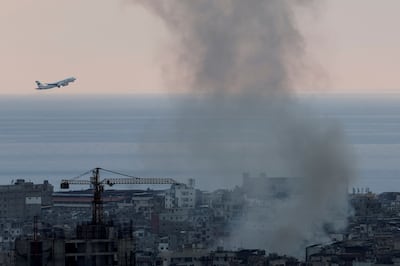Live updates: Follow the latest on Israel-Gaza
Images showing fireballs and plumes of smoke erupting across Beirut while civilian aircraft fly nearby have become daily fare as Israel pummels areas right next to Lebanon's only airport.
For many people in the country, staff with flag carrier Middle East Airlines are national heroes as they persevere despite Israel raining down bombs on the capital. Some Lebanese are incredulous that the airport is still able to operate.
“Despite the war, we continue our work. Of course, we hear the bombs and see the smoke – it’s terrifying,” one air-traffic controller, who requested anonymity, told The National. “People working at the airport are risking their lives every day to keep the airport running so Lebanese people can still travel.”
However, according to a senior safety adviser at the airline, it is business as usual.
MEA adviser
“I wouldn't call us heroes but I think we are doing a great job,” said Mohammed Aziz, who served as a pilot with MEA for decades. He is now an adviser to the chairman of the airline and an expert on aviation safety and security.
“We don't want heroes, we want people who calculate the risk and take it. Heroes are something not for the commercial side of aviation. We leave the heroes for the army and other people,” he told The National.
Late on Wednesday night, Mr Aziz flew into Beirut from Cairo at about midnight – typically the time when Israel carries out its largest nightly bombardment. He sat in the cockpit as his son piloted the plane.
'Beirut was like a ghost city'
“You could see the area of the southern suburbs was completely dark,” he said, referring to neighbourhoods that have borne the brunt of Israeli attacks. “There's nobody there. When we used to come, the whole of Beirut, the suburbs, there were lights.”
Another traveller who arrived from Doha on Saturday night said he was surprised there were 80 passengers on board his plane. “I was sat near the window and it was normal,” he said, describing a period of calm between bombings. “But Beirut was like a ghost city.”
When Israel and Hezbollah last fought an all-out war in 2006, one of the first things Israel did was bomb the airport in the capital. For now, Beirut-Rafic Hariri International is open and there is constant dialogue between Israel and Lebanese aviation authorities.
With the main road to Syria regularly bombed and chartering private boats to Cyprus and Turkey expensive, flying remains the most straightforward way to leave the country for those fleeing. The airport is also a crucial staging post for the arrival of international aid.
One reason it remains open is international pressure. The US has told its ally Israel that the site must stay running, while the Lebanese government insists it has full control of the area, implying it will not allow Hezbollah to transport weapons through the airport.
MEA adviser
Mr Aziz said MEA received assurances from major embassies in Lebanon that they wanted the airport to remain open and safe. The Lebanese government has had similar conversations with world powers, he added.
“It's our lives. As long as we are flying … we are not going to jeopardise our lives,” Mr Aziz said. “We are a civilian commercial company. Whenever we take a risk it's a very calculated risk. And as you know we cannot live without risk. What we try to do is bring it down to a level that is acceptable. As long as it is acceptable, we operate. If we find that it's not acceptable, we stop.

“We do our work, we do a good threat assessment, we tell the pilots, and they know that if we tell them they can land, they can land. If we tell them don't come now, they never question it.”
Even though all other airlines have cancelled their flights, the airport continues to function. Nevertheless, the danger is evident. Thousands of people have been killed and more than 1.2 million people displaced in the fighting. The airport is next to one of the Beirut neighbourhoods most devastated by Israel's attacks. The sound of drones and fighter jets is almost constant.
“They've always been there,” Mr Aziz said of the presence of Israeli aerial assets. “Not within a fighting environment, but we always see them. We know we are not the target.”
GPS jamming
Mr Aziz was a pilot with MEA during Lebanon's 1975-1990 civil war. He said flying now is safer compared to then. “During the civil war you had several factions fighting together. You didn't really know where it [the threat] would come from, you had to talk to 30 different people.”
Even in peacetime, aircraft coming in to land at Beirut have in the past become caught in celebratory gunfire.
If anything, the biggest challenge for pilots right now is Israel's GPS spoofing and jamming, which can interfere with flight navigation by tricking an aircraft's receiver into calculating a false position that could send the plane off course. Pilots are currently being forced to rely on alternatives to GPS.
Mr Aziz expressed pride in the team soldiering on through precarious conditions. "We will look back at what we achieved and we can say we are proud,” he said.
